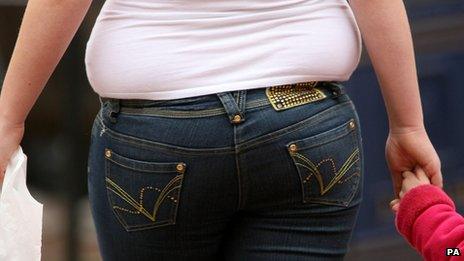Obesity challenge 'urgent' warning by chief medical officer
- Published

Urgent action is needed to tackle obesity in Wales, says the chief medical officer
Obesity is on the increase and remains one of the biggest challenges facing the population, Wales' chief medical officer has warned.
It comes in her annual report on the nation's state of health.
The report said people in Wales were living longer but ageing with chronic illnesses, many of them avoidable.
Dr Ruth Hussey also said that the economic downturn may be taking its toll on the health of the population with "no quick fixes".
"Obesity continues to increase with an associated rise in diabetes," she said in the report.
"There are more adults being treated for high blood pressure, and poor mental health remains a problem.
"Too few people do enough physical activity."
In her report, external, she described an explosion in childhood obesity as "one of the most serious health challenges of the early 21st Century".
She said the issue of overweight children had trebled in the last three decades, and could lead to "serious health consequences, significant reductions in quality of life and a greater risk of bullying and social isolation".
According to a programme brought in during 2011 to measure the height and weight of every school pupil at age five in Wales, 28% were overweight or obese.
Evidence presented in the report also suggested that there had been very little change in the rates of physical activity for any adult age group.
In addition, with the exception of the over-65s, fewer adults were eating five or more portions of fruit and vegetables a day compared with 2008.
In her conclusion, the chief medical officer stressed: "Action on obesity is urgent and there is growing evidence that physical activity benefits both our mental and physical health.

Lifestyle habits such as smoking and heavy drinking are identified as challenges by the report
"Everyone needs to be more active."
Growing older
According to official figures, life expectancy in Wales in 2009-2011 had risen to 78 years for men and 82.2 years for women.
The age you can expect to lead a full healthy life has also risen to 63 years. However, that also means that as women live longer, they can expect their general health to be poorer for longer as they get older.
But the report also warned that many chronic illnesses could be avoided by reducing smoking and drinking, alongside improvements to nutrition and increased physical activity.
The report also addressed the issue of the delicate balance between the economy of Wales and the health of its population.
"There are three major economic issues facing Wales with the potential to impact adversely on health, namely long-term structural poverty and deprivation, the impact of the economic downturn and the impact of benefit reform," said Dr Hussey.
"Poverty is currently harming health and the impact may worsen, at least temporarily, with the continued economic downturn and benefit reform.
"Poor health in turn places a significant burden on the economy.
"The challenge is whether Wales can create a beneficial cycle where better health supports a prospering economy that in turn generates good health."
'Live longer'
Responding to the publication of the report on Wednesday, the Health Minister Mark Drakeford said: "I welcome this report from the chief medical officer (CMO) in her first year in the role.
"As the CMO states we must be relentless in our aim of preventing poor health in Wales and this can be done through reducing unhealthy lifestyle factors such as smoking, drinking and obesity.
"Although life expectancy continues to improve, people are ageing with chronic illnesses which are often preventable and ageing well must be a key focus for us."
The report from the chief medical officer comes as BBC Cymru Wales launches its own season of programmes aimed at inspiring people to make their lifestyles healthier.
A poll of 502 people for the Live Longer Wales season found that 82% of people agreed that overweight people should have to lose weight before undergoing non-urgent surgery.
Two-thirds of those questioned also backed the statement that the NHS spent too much on treating preventable illness that stemmed from poor diet and a lack of exercise.
- Published7 October 2013
- Published7 October 2013
- Published26 September 2013
- Published5 July 2013
- Published4 July 2013
- Published17 May 2013